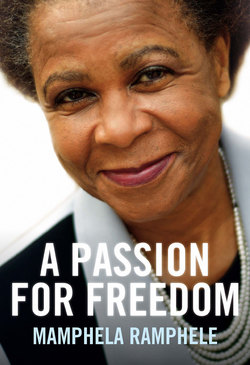Читать книгу Mamphela Ramphele: A Passion for Freedom - Mamphela Ramphele - Страница 4
На сайте Литреса книга снята с продажи.
Preface
ОглавлениеONE IS ALWAYS AMBIVALENT ABOUT TELLING ONE’S STORY. Critics may charge that one is being self-seeking or ask whether one is as true to one’s demons as to one’s angels. The issue of selective memory also rears its head: it is so easy to rewrite history for one’s own benefit.
Among those who originally inspired me to tell my story was Mrs Albertina Sisulu. She has said: ‘We are required to walk our own road – and then stop, assess what we have learned and share it with others. It is only in this way that the next generation can learn from those who have walked before them . . . We can do no more than tell our story. They must do with it what they will.’1
Storytelling is a historical imperative. We cannot successfully navigate uncharted waters without some script to guide us. This is particularly so for women, especially black women. Women have to find a script, a narrative to live by, because all other scripts are likely to depict them in roles that fit the conventional stereotypes.
Storytelling is also an urgent project for black women in South Africa where so much forgetfulness is willed upon people. It is much more convenient to forget the past than to recall its ugly face. Today hardly anyone is willing to acknowledge the support once given to the iniquitous system of apartheid, which caused so much pain to so many. With the formal death of apartheid, its former supporters have disappeared.
All the same, the temerity of writing one’s biography still needs to be explained. It is a foolish act by any description. Why should one make oneself so vulnerable? There are mitigating factors for this foolish act. I believe that growing up under apartheid promoted premature ageing. One’s childhood, adolescence and young adulthood were knocked out of one very rudely. One either grew up and survived, or was destroyed along the way.
I have other inspirations for my storytelling. The important women in my life have shaped my life through texts that have come my way in the form of praise poetry (some of which is captured in my narrative). They chanted and ululated at occasions where celebration was called for, and also had the courage to sing the praises of fallen heroes. I cannot match their elegance, but in transforming their stories into the written word, I am paying my dues for the rich milk I drank from them.
I have other more pressing reasons to tell my story. It is a story of loss. The many losses I have suffered in my short lifespan have forced me into greater self-reflection. Other people’s stories have also aided my own personal growth and made me more conscious of the interconnectedness of pain and human suffering. The loss of country, the loss of innocence, of space for creativity, personal freedom and one’s loved ones are important themes in this book. Storytelling is part of the struggle to transcend loss. This struggle for transcendence is a major theme of my narrative, as well as a historical imperative for our deeply wounded society. The past cannot be undone: it has to be transcended.
I must also acknowledge my hope that if I make myself vulnerable in this narrative there will be less reason for women in general to be seen as ‘transgressives’. If this story helps to make women feel good about who they are, and turns what is seen as abnormal for women into everyday practice, then I would have managed to intimate another possible female destiny2 – a destiny worth living and dying for. But greater will be my joy when the sons and daughters of South Africa see this alternative female destiny as mainstream and desirable. Only then shall we be truly free to reach for the sky.
1 C. Villa-Vicencio, The Spirit of Hope (Johannesburg, 1993), p. 259.
2 C. Heilbrun, Writing a Woman’s Life (New York, 1988).
